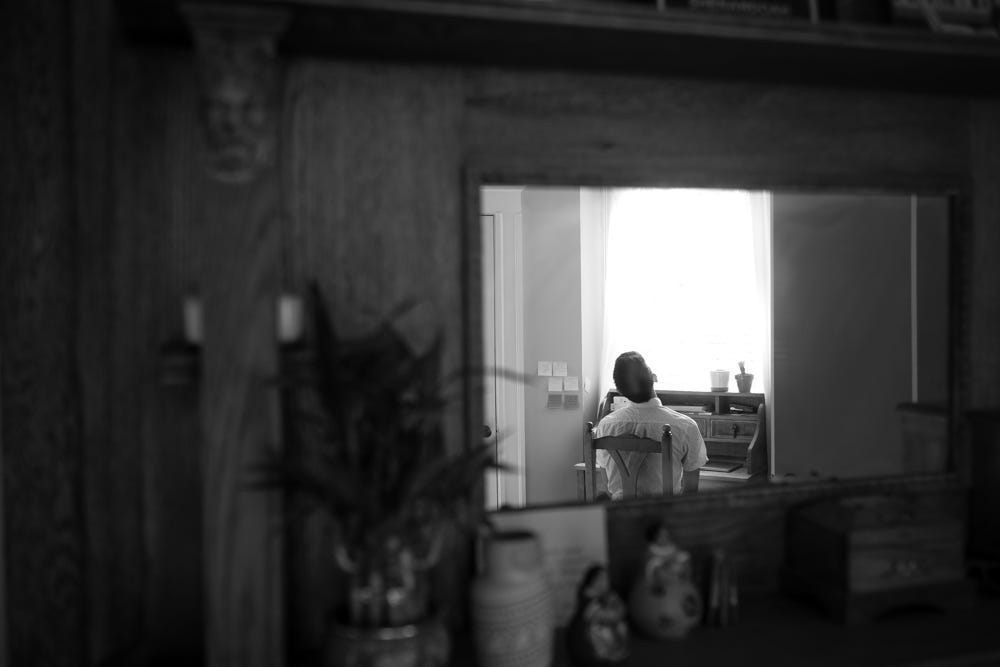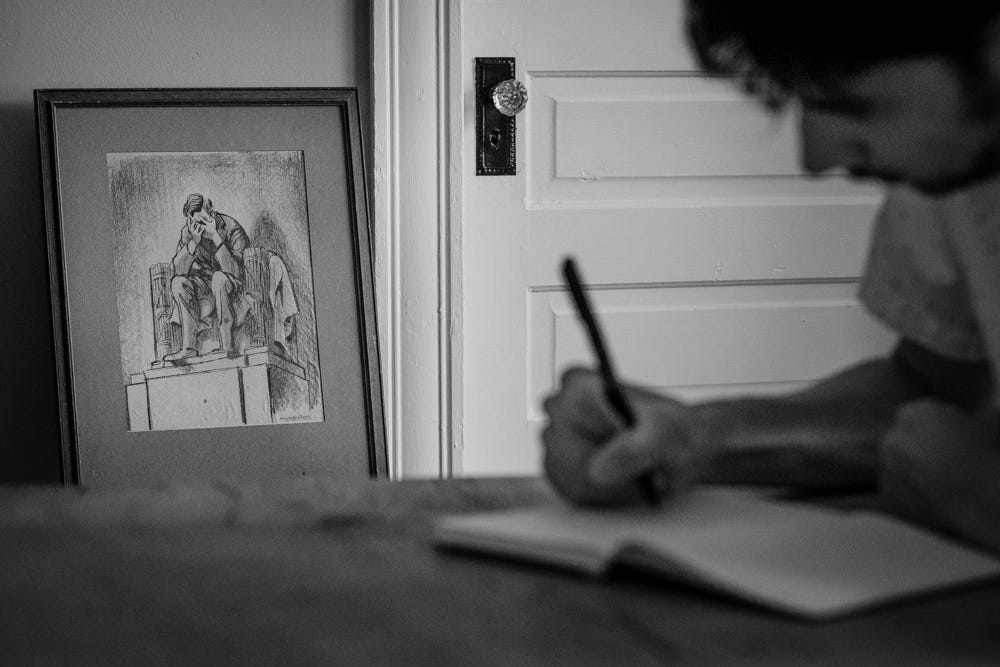👉🏽Next Sober from Bullshit 💘 Recovery Club is Monday, April 19. Register here.
👉🏽April writing workshop is live and there is some space left 🌵 Get your spot here (Sunday, 4/25, 10am - 12pm PST).
I met Arvin in grad school. The last semester of our program, we took a humor writing class together, which happened to fall the spring after I stopped drinking. Inside the angsty absurdity of early sobriety, I had plenty of fodder for my bad jokes and wannabe witty assignments, still in the beginning stages of figuring out what the hell was happening to me. I remember one evening, mentioning something about not drinking anymore, and Arvin, in his chill-as-hell way, responded, “I don’t drink either,” and it was a revelation: could not drinking simply be something I could be….cool, with? Might chill-as-hell be in *my* future? Having a friend who seemed to just rest easy in their choice helped me see something less fraught for myself, and I’ll always remember that moment.
Arvin is a talented writer and photographer, he’s funny and smart and thoughtful and honest, he’s curious and kind and though I don’t think he owns one anymore, he used to ride a monster-sized motorcycle which I always thought was super rad. It’s my honor to share some of his story here today.
I’ve long suspected that life is overrated, if not simply pointless, and for a few years from high school through college I had an antidote to this existential malaise: cheap beer and bottom-shelf spirits.
Weekend after weekend (and sometimes weekdays, and before classes) I happily said goodbye to anxiety and hello to blissful, stuporous disregard — a reprieve from a world that, even in those youthful, undemanding days, felt staggeringly indifferent, unfair, and absurd. I discovered in alcohol something powerful and precious — a substance capable of filling a bodily void, the chasm inside me where “meaning” was supposed to be but wasn’t, due to loss or theft or manufacturer error.
Sooner or later everybody bumps up against this problem — that their existence and everyone else’s could be utterly and vacuously meaningless — and finds a way to cope, by accumulating prestige or power, or embracing religion or community, or by simply disengaging. Malt liquor seemed like a pretty good solution, I thought. But it wasn’t a lasting one.
I quit drinking at 23, before I could even afford to buy the good stuff. I’ll spare you the grotesque details, other than to say that it suddenly seemed as though the term “rotgut,” usually used to describe types of whiskey, had manifested itself medically. The doctors couldn’t figure out what was wrong, but alcohol was making my condition worse and nearly unbearable. Since then, apart from a handful of unsuccessful experiments, I have remained sober — and chronically ill. I’ve not only had to stop drinking, but also eating foods like pizza, cake, mangos, plums, garlic, and onions. Pretty much anything with flavor. (I can still eat bacon. Thank God for bacon.) My illness is accompanied by a daily discomfort that frequently morphs into a malignant pain invisible to everyone but me. Sprinkle on some depression and other physical misfortunes and on bad days I’m left to wonder: What’s the point?
I don’t know if “sober” is the best word to describe my state since I’d really rather be anything but… or maybe it’s exactly the right word? I’ve tried alternatives, without success. Cigarettes are great until my lungs remind me that I’m asthmatic, marijuana induces fire-in-a-crowded-theater levels of panic, antidepressants haven’t worked so far, and anxiety pills don’t play nice with the rotgut. So for the last 12 years, it’s just been me, myself, and I, soberly attempting to work out the problem of meaninglessness.
Or maybe I should say the question of meaning. That makes it sound like less of a drag. “Everything can be taken from a man but one thing: the last of the human freedoms — to choose one’s attitude in any given set of circumstances, to choose one’s own way,” says Victor Frankl, the concentration camp survivor who wrote Man’s Search for Meaning. It’s hard to argue with a concentration camp survivor.
Frankl says it’s up to the individual to determine a meaning for their own life, and when I first read him a few years ago I thought I had one, or at least the beginnings of one: something to do with art and curiosity and telling stories. Making art and being curious and telling stories was my work as a writer, and it felt important — if not cosmically at least personally.
In American culture it’s easy to think about purpose or meaning in terms of work. We’re a cult of productivity, obsessed with the hustle. For many of us, the first thing we see in the day and the last is the dull glow of our inbox. It’s easy to criticize this lifestyle, but it’s difficult to escape. Work can be intoxicating. With it comes status, recognition, approval — or at least the dream of status, recognition, and approval — and these can feel like a counterweight to indifference, unfairness, and absurdity. There is the sense that if you “make it,” you matter. Success becomes the goal. Your focus shifts from the work to what the work might bring. And perhaps ironically, this makes it harder to work.
I’ve struggled with this particularly during the pandemic, cut off from the things that otherwise make life enjoyable: friends, family, live music, road trips. There is only work, and the feeling that success in work will bring some sort of fulfillment, maybe even meaning. In this way, I think my relationship to work has begun to resemble my relationship to alcohol. Each has the ability to become an existential bandaid, a suture for the cosmic wound. The problem is that, like an afternoon buzz, any external rewards that come from work quickly fade. For me, at least, the pleasant feeling that accompanies a new publication lasts as long as the lifespan of the social media post promoting it.
I really haven’t reconciled any of these problems, but I am making an attempt to be more mindful of my relationship to and motivations for work, as well as mindful of the things in life that bring joy. Maybe that’s one of the things the pandemic has taught us, by taking so much away.
I quit drinking when I moved to New York and simply told all the new people I met that I don’t drink. As I strive for a new shift, I need to make another declaration, but to myself. I’d be lying if I said I felt any less existentially morose or any more sure about the problem, or the question, of meaning. But I recognize that art and curiosity and storytelling — at least in their most genuine forms — still call to me, and that I can choose to spend my hours or weeks or months or years in their pursuit, with no real discernible end or success or reward in sight. Maybe that’s the point.
Arvin is a freelance writer and photographer trying to figure shit out in Atlanta. He's on Instagram @arvintemkar.
Slow Motion Sober is a newsletter and community for creative types who are sober or curious about sobriety, and all the life-y intersections along the way. It's written by me, Dani, a writer and sobriety advocate in San Francisco, CA.
SMS is reader-funded. The small percentage of readers who pay make the entire publication possible.
You can also support me for free by pressing the little heart button on these posts, sharing this newsletter with others and letting me know how this newsletter helps you. Thank you.









Thanks for sharing Arvin's story. I think he's figured out "the point." Find meaning in letting creativity flow, not in the hope of "success," but for the joy of it. Of course, he's got to earn a living, too, and I'm sure he will, one way or another.